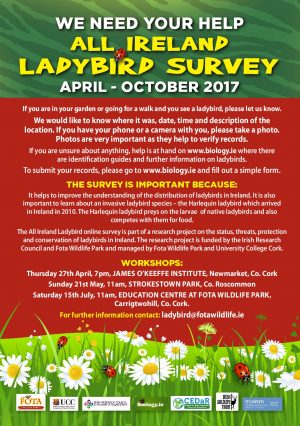5 ways to become a Citizen Scientist during National Biodiversity Week 2017

12th May 2017
Ireland’s National Biodiversity Week is nearly upon us!
Over the course of ten days – 19th – 28th May 2017 – over 50 free events will be taking place all across the country celebrating Ireland’s diverse species and natural habitats.
From bat walks to whale watching, urban bee-keeping to eco-village tours, there is bound to be something taking place near you.
For those who would like hands-on experience in recording and monitoring Ireland’s flora and fauna, there are a number of citizen science projects that you can get involved with.
Citizen Science
Citizen scientists are volunteers who play an active role in gathering data for scientists. According to a November 2016 study published in the journal Biological Conservation, citizen science has the potential to contribute hugely to regional and global assessments of biodiversity. Citizen science can engage thousands of people in conducting simple experiments, providing data that would be too time-consuming to generate through other means.
Here are five great citizen science projects you can get involved in to support our own biodiversity here at home:
1. BATLAS 2020
Bat Conservation Ireland run training courses all over the country for people interested in learning how to survey and monitor bats. The BATLAS training is suitable for anyone who has some bat survey experience (beginners may benefit from starting with the Daubenton’s survey before moving onto BATLAS). You can download a BATLAS manual here to find out more about the survey. There is also an instructional video to give you an overview of the scheme and to provide step-by-step instructions on how to register and submit your results to our online portal.
There are a number free BATLAS training events running throughout Biodiversity Week in Kilkenny, Kildare and Dublin – click the link for a calendar.
2. Bird & Butterfly Monitoring Workshops by the IPCC
As part of Biodiversity Week 2017, the Irish Peatland Conservation Council (IPCC) is offering two free workshops on how to identify and monitor both birds and butterflies, in accordance with the methods laid out by the NBDC (National Biodiversity Data Centre). The participants will be trained in butterfly monitoring becoming citizen scientists with the potential to contribute to the NBDC’s Irish Butterfly Atlas. For more see their event pages:
Celebrating Birds and Butterflies, Girley Bog NHA, Co. Meath
Marsh Fritillary Butterfly identification and monitoring workshop
3. Count Flowers For Bees
Eileen Power, Post Doctoral Researcher at Trinity College Dublin, is looking for citizen scientists to help her create a flower map of Ireland. To help contribute to her work to help Irish bee populations, all you need to do is follow these 3 steps: (1) click on this link, (2) look at photos of flowery grasslands from across Ireland; and (3) count the flowers and categorise them into simple groups. You can do as much or as little as you like, and you don’t even need to get off your couch. To learn more about Power’s work, check out this article in the Irish Independent.
4. The All Ireland Ladybird Survey Workshop, Roscommon
The All Ireland Ladybird online survey is part of a research project on the status, threats, protection and conservation of ladybirds in Ireland. If you are out and about and spot a ladybird, you are invited to take a photo and submit it along with a quick survey on www.biology.ie. The research project is funded by the Irish Research Council and Fota Wildlife Park and managed by Fota Wildlife Park and University College Cork.
A Ladybird Workshop will be taking place during Biodiversity Week on Sunday 21st May in Strokestown Park, Co. Roscommon. Click here for more details.
5. Citizen Science: From Soil to Sky
GROWObservatory is a European-wide project engaging thousands of growers, scientists and others passionate about the land. As part of the project, GROW is running a free online course on soils which equip students with the tools and knowledge to become a citizen soil scientist. As a student of the ‘From Soil to Sky’ course, you will conduct simple, coordinated soil experiments to capture and make sense of data on their local environment. This helps validate good growing practices while contributing to vital scientific environmental monitoring.
To lean more about the Soil to Sky class, watch this video – and visit www.growobservatory.org.
[x_author title=”About the Author”]












